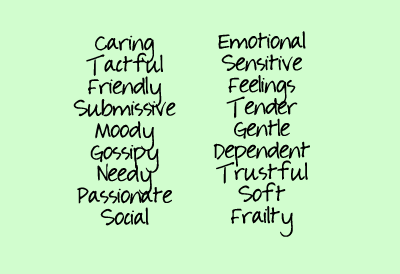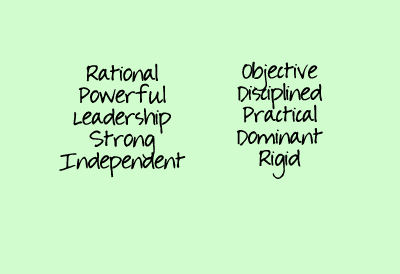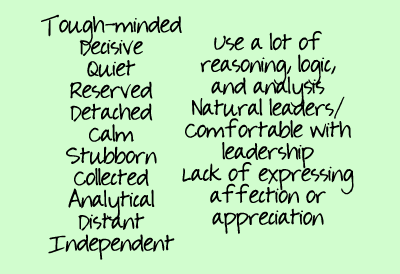I thought it only suitable that I tie-in my previous INTJ post with a topic I will likely touch on frequently: sexism.
Being a female INTJ is at odds with quite a lot of gender stereotypes. If I do a quick search on Google for “feminine traits” or “woman traits” the following words and ideas come up:
Compare that to the kinds of words that are used to describe men on the same sites:
In turn, compare both of those to this a list of adjectives used to describe an INTJ personality type:
None of these are exhaustive nor are they intended to be, but you can quickly see that an INTJ personality overlaps quite a lot with stereotypically categorized “masculine” traits. A woman that exhibits many characteristics that are widely believed and taught in society to be traits men should have and/or few of the traits women are supposed to have encounter quite a lot of backlash.
A woman who is very logical and reserved is seen as stiff and cold where a man with the same traits will often not be described the same way. The problem only increases the more “masculine” traits she has and the stronger those traits are. Being an assertive go-getter would lead to a brilliant career for men but in a woman it grants her the lovely opportunity of being called a bitch.
It suffices to say that not all of these traits listed are positive (e.g. stubborn, lack of appreciation) so of course I would run into problems with those, regardless of my gender. (Though it can still be an issue related to gender, that’s a post for another day.) Where it is problematic is where I embody all of those traits that are neither positive nor negative (e.g. analytical, leadership) but happen to be more stereotypically masculine. If you recall my previous explanation of the MBTI or know anything about it, my preferences for each of the four qualities is fairly strong and my overall identification as an INTJ is also strong. I’m not just independent or reserved, I am very independent and very reserved. It means I grew up having a personality nearly the complete and utter opposite to what society, my culture, even my family was telling me I should be as a woman.
For a time I admit I tried being someone else, doing all the things that other girls did – or rather, at the time what I thought they did – to try to become the woman I thought I was supposed to be. That didn’t last very long. I just couldn’t do it. Little did I know at the time that was just the beginning to a lasting struggle to own who I really was while also striving to improve as a person and live my daily life against others’ expectations.
It’s a road I’ve only in recent years even fully realized I had been on, both due to the lack of self-awareness and recognition of sexism as well as requiring some time and distance to properly look back and reflect on things. I’ve always known I was a little different from society’s expectation of me as a woman but I hadn’t completely identified why until I started learning about feminism and I’m still learning.
On one hand, I haven’t really known how to be anything else. I simply am who I am, woman and INTJ and stereotypically “masculine” traits and all. On the other hand, I take pride in rejecting gender norms and defining my womanhood to include anything and everything about me; my personhood and womanhood are one and the same. I am not a person with “feminine” and “masculine” traits but rather a woman and person with a variety of traits that may or may not be shared by other people.
I chose my initial focus on being an INTJ as a springboard because it works twofold; it allows people to get a very quick but in-depth picture of my personality and it establishes the beginning of my journey to questioning everything and therefore all the things that I will end up discussing here.







